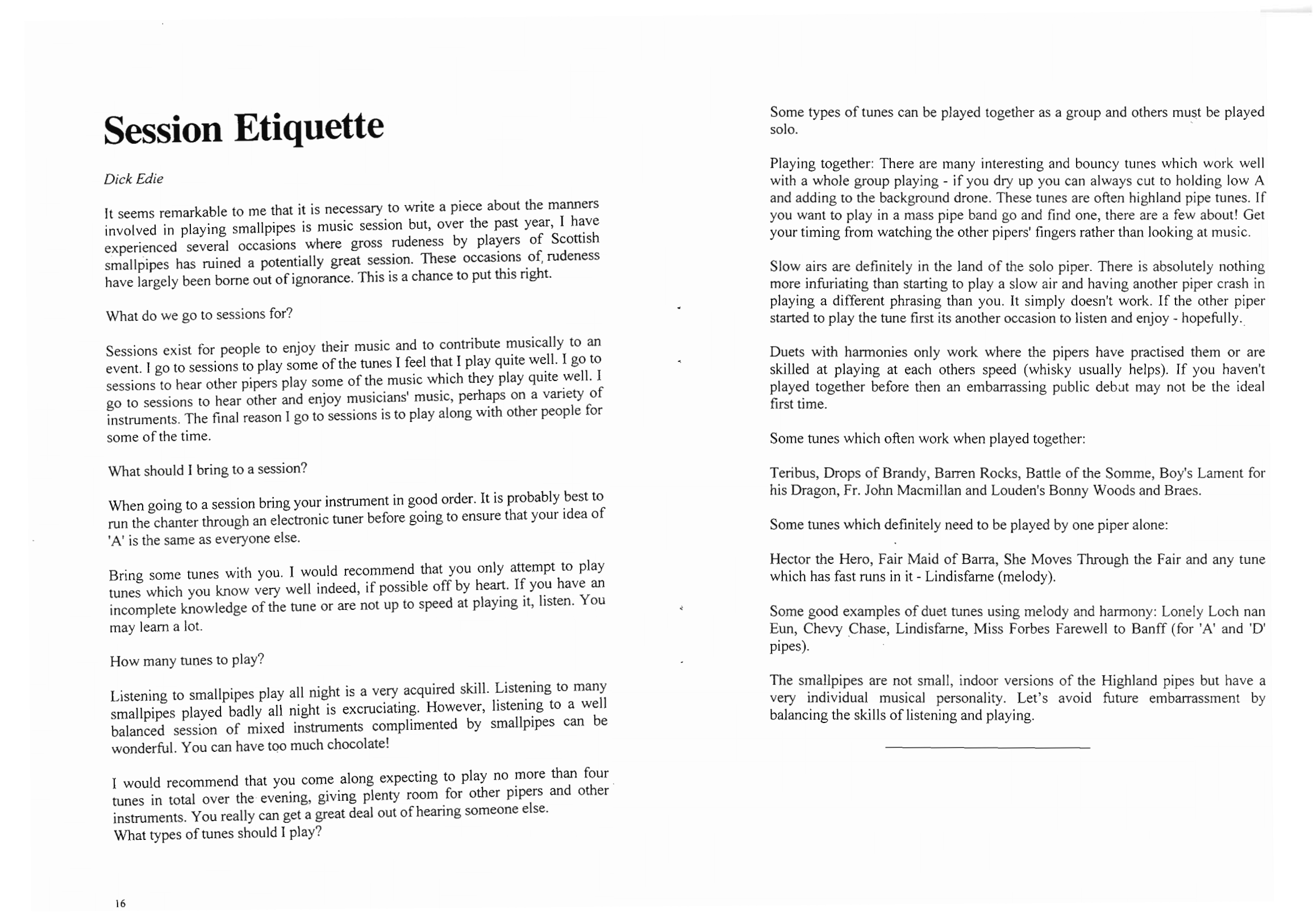Session Etiquette

Dick Edie
It seems remarkable to me that it is necessary to write a piece about the manners involved in playing smallpipes in music session but, over the past year, I have experienced several occasions where gross rudeness by players of Scottish smallpipes has ruined a potentially great session. These occasions of, rudeness have largely been borne out of ignorance. This is a chance to put this right.
What do we go to sessions for?
Sessions exist for people to enjoy their music and to contribute musically to an event. I go to sessions to play some of the tunes I feel that I play quite well. I go to sessions to hear other pipers play some of the music which they play quite well. I go to sessions to hear other and enjoy musicians’ music, perhaps on a variety of instruments. The final reason I go to sessions is to play along with other people for some of the time.
What should I bring to a session?
When going to a session bring your instrument in good order. It is probably best to run the chanter through an electronic tuner before going to ensure that your idea of ‘A’ is the same as everyone else.
Bring some tunes with you. I would recommend that you only attempt to play tunes which you know very well indeed, if possible off by heart. If you have an incomplete knowledge of the tune or are not up to speed at playing it, listen. You may learn a lot.
How many tunes to play?
Listening to smallpipes play all night is a very acquired skill. Listening to many smallpipes played badly all night is excruciating. However, listening to a well balanced session of mixed instruments complimented by smallpipes can be wonderful. You can have too much chocolate!
I would recommend that you come along expecting to play no more than four tunes in total over the evening, giving plenty room for other pipers and other instruments. You really can get a great deal out of hearing someone else.
What types of tunes should I play?
Some types of tunes can be played together as a group and others must be played solo.
Playing together: There are many interesting and bouncy tunes which work well with a whole group playing - if you dry up you can always cut to holding low A and adding to the background drone. These tunes are often highland pipe tunes.
If you want to play in a mass pipe band go and find one, there are a few about! Get your timing from watching the other pipers’ fingers rather than looking at music.
Slow airs are definitely in the land of the solo piper. There is absolutely nothing more infuriating than starting to play a slow air and having another piper crash in playing a different phrasing than you. It simply doesn't work. If the other piper started to play the tune first its another occasion to listen and enjoy - hopefully.
Duets with harmonies only work where the pipers have practised them or are skilled at playing at each others speed (whisky usually helps). If you haven't played together before then an embarrassing public debut may not be the ideal first time.
Some tunes which often work when played together:
Teribus, Drops of Brandy, Barren Rocks, Battle of the Somme, Boy’s Lament for his Dragon, Fr. John Macmillan and Louden’s Bonny Woods and Braes.
Some tunes which definitely need to be played by one piper alone:
Hector the Hero, Fair Maid of Barra, She Moves Through the Fair and any tune which has fast runs in it - Lindisfarne (melody).
Some good examples of duet tunes using melody and harmony: Lonely Loch nan Eun, Chevy Chase, Lindisfarne, Miss Forbes Farewell to Banff (for ‘A’ and ‘D’ pipes).
The smallpipes are not small, indoor versions of the Highland pipes but have a very individual musical personality. Let’s avoid future embarrassment by balancing the skills of listening and playing.
